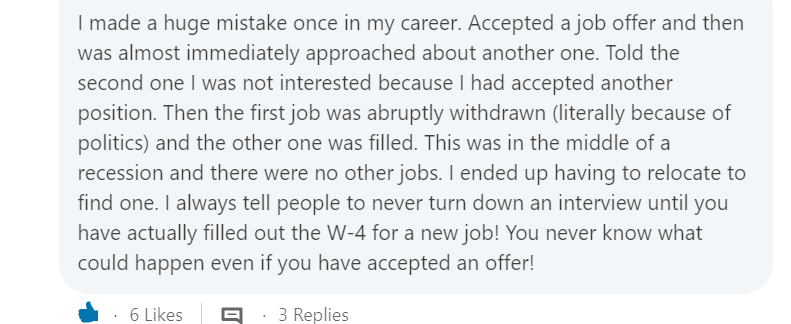
How to Turn Down a Job Offer: 4 Sample Emails/Letters

If you’re looking for examples of how to turn down a job offer gracefully, you’re in the right place.
I recently posted on LinkedIn about why you should try to get multiple job offers. That way, if there’s an unexpected issue or one falls through, you still have options.
Yet a few people commented that turning down a job offer is STRESSFUL. And it’s true.
So I want to remove the stress by giving you exact sample emails and letters to decline a job offer.
Let’s get started…
Turning Down a Job Offer – Email vs. Phone
First – while I’m about to share multiple examples of how you can turn down a job offer gracefully via email/letter, I’d recommend you consider doing it via phone call.
You can use any of these sample emails as a phone script for declining a job offer, too.
If you’ve been speaking with the company on the phone, they’ll respect you a lot more for delivering the news over the phone.
An average message delivered over the phone will often earn you more respect than a perfectly-worded email declining the job offer.
So keep that in mind. However, the choice is yours. I’m just here to share what I recommend.
And I know doing it on the phone is a bit uncomfortable/challenging. But if you want to leave the employer with a great impression of you, then a phone call is the best way to turn down a job offer.
Next, let’s look at tips and steps to follow when contacting an employer to turn their job offer down.
How to Turn Down a Job Offer: Steps
- Contact the person who informed you they were offering you the job (usually HR or a hiring manager)
- Tell them that unfortunately, you decided this isn’t the right fit for you at the moment, and you won’t be accepting the offer
- Express gratitude and appreciation for the job offer. Tell them you appreciate the time they spent interviewing you
- If you’re accepting another offer instead, you can tell them that another opportunity came up that you felt was a slightly better fit for you right now. However, you’re not obligated to inform them of this
- If you’re declining for another reason, you can inform them of the reason but it is not required. This is your decision
- Conclude by thanking them again for their time and wishing them luck in finding the right person for their job
- Never badmouth the company. It’s okay to decline a job offer because you had a bad experience with the employer, but it’s best to just let it go now. Decline the offer and move on.
This is how you turn down a job offer gracefully and professionally. Don’t worry if you’re still not sure exactly how to word it. Next, we’re going to look at 4 examples of how to decline an offer without burning any bridges.
4 Examples of Turning Down a Job Offer Gracefully via Email/Letter
Here are 4 proven sample emails/letters you can use to decline a job offer.
We’ll look at examples of how to inform the employer you’ve accepted another offer, and examples of how to decline the job offer without telling them the reason. (You don’t need to share a specific reason for declining. That’s up to you.)
Sample Letter/Email #1 to Turn Down a Job Offer:
Hi <NAME>,
Thank you so much for offering me the <Job Title> position.
I have decided to accept a different position and won’t be able to accept this offer.
I appreciate the time spent interviewing me and introducing me to your organization throughout this process, and <Company Name> sounds like a fantastic company.
It was a difficult decision, and I wish you success in finding the right person for your role.
Thank you again for your time.
Best regards,
<YOUR NAME>
You always want to show gratitude for an offer before responding with any requests or final decisions.
So this sample email includes that in the first line.
Of course, if you already thanked them for the offer and have taken a few days to think, you don’t need to thank them again when you follow up. You can simply deliver the news and inform them that you decided to turn down the offer.
So the next few example emails get to the point faster.
Example Letter/Email #2 for Declining a Job Offer:
Hello <NAME>,
I hope you’re doing well.
I’m circling back regarding the <Job Title> job offer.
Unfortunately, I have decided to pursue another opportunity rather than accepting this offer.
I appreciate the time you and your team spent meeting with me and putting together this offer, and I wish you luck in finding the right person for the job.
Best regards,
<YOUR NAME>
This example email is a way to politely decline a job offer without having to share the reason. You can simply say you’ve chosen to pursue a different opportunity or direction.
Whereas, in the first sample email above this, we shared a more specific reason – the fact that we “have decided to accept a different position.”
So you can decide how much or how little to share. Sometimes you’ll decline a job offer even if you haven’t accepted another offer yet, so you can use this template in those cases.
Let’s look at two more examples/variations now for how you can deliver the news to an employer.
Example Letter/Email #3 for Turning Down a Job Offer:
Dear <NAME>,
I hope all is well.
I wanted to follow up regarding the <Job Title> position, as I’ve come to a decision.
Unfortunately, I have decided to pursue a different opportunity and must decline this offer.
I wish you luck in finding the right person for this role and I appreciate the time and effort that went into interviewing me and extending me this offer.
Thank you again for the opportunity.
Best regards,
<YOUR NAME>
This email example is very similar to the previous example. However, the wording is slightly stronger and more formal.
You can choose what type of wording and what level of formality you want. We’ll talk more about customizing these email templates in the next section. First, one more example…
Sample Letter/Email #4 for Declining a Job Offer:
Dear <NAME>,
I wanted to follow up regarding the <Job Title> position.
I was offered another opportunity that I feel is a slightly better fit for my skill set and career goals, so I’ve decided to accept that other offer instead.
This wasn’t an easy decision, and <Company Name> seems like a fantastic place to work. I hope you and your team are successful in finding the right person for your role.
Thank you again for the opportunity; I appreciate your time and effort throughout this process.
Best regards,
<YOUR NAME>
This template includes a bit more detail than those above it.
If you had a really great experience interviewing with a company, it can be a nice touch to tell them that this was a very tough decision and you appreciate them.
Never feel pressure to include this level of detail when you turn down a company’s offer, but it’s an option available to you.
If something stood out to you while getting to know them – like their great work culture, their professionalism and kindness, etc. – it’s nice to tell them you appreciate this.
Customizing These Sample Letters/Emails
You can mix and match pieces from these sample letters above.
You can remove a line or two from the email examples above if you feel something is not needed or relevant for your situation.
And you also can add anything that you feel is needed or missing based on your specific situation.
Finally, you should adjust these sample letters for formality, especially the greeting. If you’re in a more formal industry, say, “Dear Name.” If you’re interviewing at tech start-ups, you’re probably going to want to say, “Hi Name” instead.
No single template is going to be able to fit every situation for every job seekers, so that’s why you may need to customize. A Finance job seeker in London is going to need to speak differently when declining an offer compared to an entry-level Salesperson in the US. So think about your audience/industry/location and then customize these sample emails for you!
When to Tell the Employer You’re Declining Their Offer
You should inform an employer as soon as you’re sure about your decision. However, you shouldn’t rush yourself. For example, if you’re waiting for news from another employer or would like to discuss the decision with your family for a few days, that’s entirely normal and you should ask for the time you need (within reason).
An employer should understand that choosing to accept or decline an offer is a huge decision.
And just like they took their time interviewing candidates and choosing who should receive a job offer, you need time to conduct your process, too.
And if you’re declining a job offer to accept another one, be 100% sure that the other offer is finalized before you turn down the other offer. Sign the physical papers, fill out your tax paperwork, etc. Everything.
Here’s a LinkedIn comment showing what can go wrong if you reject one offer without being 100% sure about the other one:

Next, I’ll share a couple of examples of how to ask for additional time to consider your job offer. You should NEVER accept an offer on-the-spot. So get comfortable using the scripts below to thank them for their offer and ask for some time to review everything at home.
You can either ask for a certain amount of time, like this:
“Thank you so much. I’m thrilled about the offer. Can I inform you of my decision on Monday? I like to weigh important decisions like this carefully and discuss them with my family.”
Or you can ask when they’d need an answer:
“Thank you so much. I’m thrilled about the job offer. I always weigh important decisions like this carefully and discuss them with my family, though. When do you need my decision?”
Declining a Job Offer Doesn’t Need to be Difficult
If you follow the steps above, you’ll avoid burning any bridges and leave the employer with a good impression.
At the same time, you’ll be able to move on with your life and stop feeling the stress of putting this conversation off.
Just make sure you’re 100% certain of your decision before delivering the news. If you’re turning down a job offer to accept another position, make sure everything is finalized for that other job (including paperwork, etc.) Declining a job offer is usually final and the employer will quickly move on to other candidates after hearing the news.